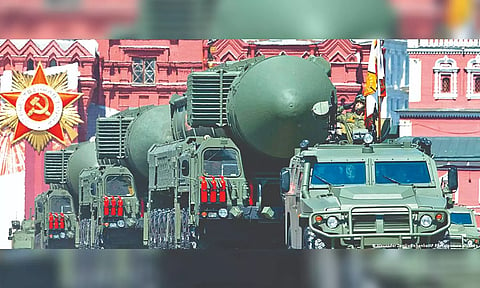

By JURI RESCHETO
WASHINGTON: A nuclear test over Siberia would be “a nuclear ultimatum” to the West that would have no serious consequences for Russia’s own population — according to Margarita Simonyan. The editor-in-chief of RT, Russia’s state-controlled international broadcaster, made the claim in a video in early October.
There, she declared that “nothing too terrible” would happen if Russia detonated a thermonuclear bomb on its own territory, and that Western countries would not back down “until they are in great pain.”
According to Simonyan, the West has nothing better to do than continue using Ukraine to “strangle” Russia.
The media executive is one of the best-known faces of Russian propaganda. She often appears on the evening TV talk show hosted by her colleague Vladimir Solovyov and is known for her diatribes against Ukraine and the West, especially the USA. But her assertion that Russia could detonate a nuclear bomb in its own backyard seems to have gone a step too far. Not only did it upset the viewers, but it also caused a stir in the Kremlin.
Putin’s press secretary Dmitry Peskov commented that Simonyan’s words “do not always reflect the official position,” and that he did not see the sense in this discussion.
Nevertheless, the discussion resurfaced this week, and Simonyan’s remarks were probably at the forefront of the minds of Russian MPs on Tuesday, when the Russian parliament, the Duma, voted unanimously to withdraw from the Comprehensive Nuclear Test Ban Treaty (CTBT). The idea was recently floated by President Putin himself, and taken up by the chairman of the Duma, Vyacheslav Volodin.
The CTBT, banning all nuclear explosions anywhere in the world, was one of the last international arms treaties that Russia considered binding. Moscow’s justification for its withdrawal was that the United States had never actually ratified the treaty and that it was time for Russia to revoke its ratification in turn to create balance. The USA and Russia possess about 90% of all the nuclear warheads in the world.
The Comprehensive Nuclear Test Ban Treaty was signed in 1996 by Russia, the USA, and China. However, unlike the other signatories, Russia actually ratified the treaty in 2000, as the nuclear expert Pavel Podvig of the United Nations Institute for Disarmament Research (UNIDIR) pointed out in an interview with DW. Podvig explained that the treaty never officially entered into force, but that the five major nuclear powers — the USA, Russia, China, France, and Britain — have nonetheless adhered to the moratorium on nuclear tests since the 1990s.
India and Pakistan have also refrained from further nuclear tests since the initial ones in 1998, Podvig said. “In this respect, the only dissident, so to speak, is North Korea, which has already conducted six nuclear tests. ” Podvig stressed that the arms treaty is held in high regard across the world. “No one is going to win friends by conducting new nuclear tests. All the ideas being discussed in Russia right now — along the lines of ‘Let’s scare everyone!’ — are not actually likely to scare anyone. There will, however, be unequivocal condemnation.”
Russia’s withdrawal from the treaty sent a political message, Podvig pointed out. From a legal point of view, it meant there was one less reason for Russia to adhere to its self-imposed moratorium.
Russian nuclear expert Maxim Starchak of Canada’s Foreign Policy Research Institute said he would not be surprised if Russia did carry out nuclear tests soon. But he assured DW that “so far, there are no clear indications that Russia is planning any such tests in the near future.”